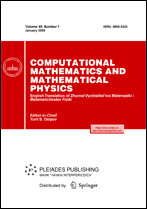|
This article is cited in 3 scientific papers (total in 3 papers)
Computer difference scheme for a singularly perturbed convection-diffusion equation
G. I. Shishkin
Krasovskii Institute of Mathematics and Mechanics, Ural Branch, Russian Academy of Sciences, ul. S. Kovalevskoi 16, Yekaterinburg, 620990, Russia
Abstract:
The Dirichlet problem for a singularly perturbed ordinary differential convection-diffusion equation with a perturbation parameter $\varepsilon$ (that takes arbitrary values from the half-open interval $(0, 1]$) is considered. For this problem, an approach to the construction of a numerical method based on a standard difference scheme on uniform meshes is developed in the case when the data of the grid problem include perturbations and additional perturbations are introduced in the course of the computations on a computer. In the absence of perturbations, the standard difference scheme converges at an $O(\delta_{st})$ rate, where $\delta_{st}=(\varepsilon+N^{-1})^{-1}N^{-1}$ and $N+1$ is the number of grid nodes; the scheme is not $\varepsilon$-uniformly well conditioned or stable to perturbations of the data. Even if the convergence of the standard scheme is theoretically proved, the actual accuracy of the computed solution in the presence of perturbations degrades with decreasing $\varepsilon$ down to its complete loss for small $\varepsilon$ (namely, for $\varepsilon=O(\delta^{-2}\operatorname{max}_{i,j}|\delta a_i^j|+\delta^{-1}\operatorname{max}_{i,j}|\delta b_i^j|$), where $\delta=\delta_{st}$ and $\delta a_i^j$, $\delta b_i^j$ are the perturbations in the coefficients multiplying the second and first derivatives). For the boundary value problem, we construct a computer difference scheme, i.e., a computing system that consists of a standard scheme on a uniform mesh in the presence of controlled perturbations in the grid problem data and a hypothetical computer with controlled computer perturbations. The conditions on admissible perturbations in the grid problem data and on admissible computer perturbations are obtained under which the computer difference scheme converges in the maximum norm for $\varepsilon\in (0, 1]$ at the same rate as the standard scheme in the absence of perturbations.
Key words:
singularly perturbed boundary value problem, ordinary differential convection-diffusion equation, boundary layer, standard difference scheme on uniform meshes, perturbations in data of the grid problem, computer perturbations in computations, maximum norm, stability of a scheme to perturbations, conditioning of a scheme, computer difference scheme.
Received: 21.02.2014
Citation:
G. I. Shishkin, “Computer difference scheme for a singularly perturbed convection-diffusion equation”, Zh. Vychisl. Mat. Mat. Fiz., 54:8 (2014), 1256–1269; Comput. Math. Math. Phys., 54:8 (2014), 1221–1233
Linking options:
https://www.mathnet.ru/eng/zvmmf10073 https://www.mathnet.ru/eng/zvmmf/v54/i8/p1256
|


| Statistics & downloads: |
| Abstract page: | 391 | | Full-text PDF : | 101 | | References: | 77 | | First page: | 11 |
|





 Contact us:
Contact us: Terms of Use
Terms of Use
 Registration to the website
Registration to the website Logotypes
Logotypes








 Citation in format
Citation in format 
